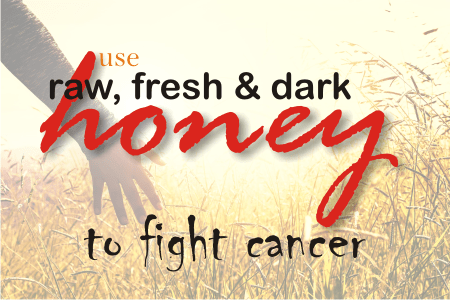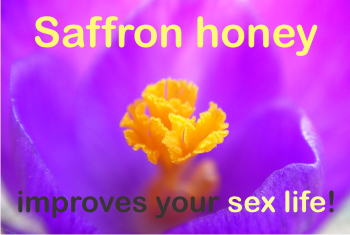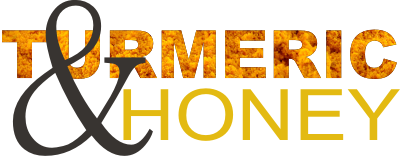Most cancer treatments exclude sugar from the patient’s diet. Medical doctors prescribe chemo, radiation (surgery when required), and give a specific diet that excludes, almost completely, sugars.
It is considered that malignant cells feed themselves on sugars, so it is better to let them starve.
But, you know what other cells feed themselves on sugars? The healthy ones!
It’s an impossible mission. If you eat sugars, the bad cells will thrive. If you don’t eat sugars, the bad cells will not be fed, but neither will your healthy cells – which should have enough energy to protect your organism and fight the evil cells.
The solution might be offered by a different kind of sugar: honey.
Honey is a natural product with important biological or pharmacological activities—ranging from anti-inflammatory, antioxidant, antibacterial, antihypertensive and hypoglycemic effects. But it doesn’t stop here.
The antimetastatic, antiproliferative and anticancer effects of honey
This affirmation does not come from our elders, who could not tell the scientific names of what honey was doing in our body. Or care about those names. Traditionally, (only) all the good effects of honey have been transmitted to us, without explanations regarding how it works.
The above affirmation comes from modern scientific studies, from researchers who didn’t trust the elders and wanted to check for themselves.
A review from 2014, carried by Omotayo O. Erejuwa, Siti A. Sulaiman and Mohd S. Ab Wahab from the Department of Pharmacology, School of Medical Sciences, Universiti Sains Malaysia, focuses on the role of honey in modulating the development and progression of tumors or cancers.
Cancer is more visible in developing countries. We blame several environmental factors, such as smoking, physical inactivity, infections, and diseases including obesity and diabetes, as the key risk factors.
Cancer is fought with surgery, chemotherapy, and radiation, which also come with downside factors: side and adverse effects, and growing resistance.
Which is why complementary and alternative medicine have started to be studied more. It does have limitations, but it also brings important advantages: affordability, availability, and lower side effects.
Complementary and alternative medicine include dietary components, supplements, herbal preparations, naturally-derived products, and, even more importantly, lifestyle changes. Among them, honey.
Honey is one natural, important product included in an alternative protocol. Its composition, which includes biologically active constituents such as flavonoids and phenolic compounds, vitamins, trace elements, amino acids and proteins, as well as certain enzymes including glucose oxidase, invertase, and catalase, qualifies it as a complex and trustworthy product, worthy of, at least, more investigation.
Lots of studies on its effect have been done on breast, liver, and colorectal cancers. Fewer studies, yet with promising data, are also available for cancers including prostate, bladder, endometrial, kidney, skin, cervical, oral, and bone cancer cells.
Keep in mind that honey is healthy as long as it is raw and fresh (in its first 3 month after harvest). If your honey was kept in poor conditions, at warm and light, or it’s old, it is no longer a qualitative one.
Honey with high content of poliphenols is the one recommended in cancer. The processed, low-quality honeys are only sugars and these are bad for our health (especially in cancer).
Honey fights breast cancer
• Tualang honey
In the study “Tualang honey induces apoptosis and disrupts the mitochondrial membrane potential of human breast and cervical cancer cell lines” published in 2011, by Fauzi, A.N. et al., the cytotoxicity was evident by increased leakage of lactate dehydrogenase (LDH) from the cell membranes. Tualang honey was shown to induce apoptosis and reduce mitochondrial membrane potential.
Also, very important, the authors also found that honey exerted no cytotoxic effect in MCF-10A, a normal breast cell line.
• A 2017 study “The anti-cancer effects of Tualang honey in modulating breast carcinogenesis: an experimental animal study” conducted by Sarfraz Ahmed and Nor Hayati Othman concluded that “Tualang Honey alleviates breast carcinogenesis through modulation of hematologic, estrogenic and apoptotic activities in this experimental breast cancer animal model. Tualang Honey may be used as a natural ‘cancer-alleviating’ agent or as a supplement to chemotherapeutic agents.”
• Another 2017 study “Oral Administration of Tualang and Manuka Honeys Modulates Breast Cancer Progression in Sprague-Dawley Rats Model“, conducted by Sarfraz Ahmed, showed that both Tualang and Manuka honeys exhibit antibreast cancer activity.
• In a preliminary study from 2013 conducted by Abd Kadir and colleagues, “Inhibitory effects of Tualang Honey on experimental breast cancer in rats: a preliminary study”, honey exhibited anticancer effect as evident by its antiestrogen activity and potential in inducing mitochondrial membrane depolarization and apoptosis in breast cancer cells. The antiproliferative and antimetastatic effects of honey are also demonstrated by its ability to suppress tumorigenesis and reduce size and number of tumors in DMBA-induced breast cancer in rats.
• In a 2003 study by Orsolic, N.et al.,”Innfluence of honey bee products on transplantable murine tumours.” products of the bees were investigated in regard to their antitumor and antimetastatic effect. Here are their findings:
– Honey is more preventative: it exerted pronounced anti-metastatic effect (P < 0.05) when applied before tumor-cell inoculation (peroral 2 g kg(-1) for mice or 1 g kg(-1) for rats, once a day for 10 consecutive days);
– propolis is curative: Oral or systemic application of water-soluble derivative propolis WSDP or caffeic acid (polyphenolic compounds of propolis) significantly reduced subcutaneous tumor growth and prolonged the survival of mice;
– royal jelly is curative: intravenous administration of royal jelly before tumor-cell inoculation significantly (P < 0.05) inhibited metastasis formation;
– bee venom is preventative: the antitumor and antimetastatic effects of bee venom are highly dependent on the route of injection and on close contact between components of the bee venom and tumor cells. (read more about how to cure breast cancer with bee venom)
Honey effect on Ehrlich ascites and solid carcinoma
• In a study from 2010, “Effect of honey and eugenol on Ehrlich ascites and solid carcinoma.” Jaganathan, S.K. and his colleagues investigated the effect of two honey samples containing different phenolic contents against Ehrlich ascites and solid carcinoma. Both honeys were found to markedly inhibit the growth of Ehrlich ascites carcinoma, but the honey containing higher phenolic content exerted a greater antitumor effect. The results were similar to those in vitro apoptosis studies, conducted on colon cancer cells, where honey containing higher phenolic content was able to inhibit cancer cell proliferation.
The antitumor effect of honey observed in the present investigation was similar to the effect of some other natural products like black tea and jacalin against Ehrlich ascites, reported previously.
“Although cancer cells feed on sugars, the high sugar content of honey, if injected directly into the tumour site, may influence the tumour stroma through the osmolarity effect” – Laura M. Porcza et al., 2016
Honey fights colon cancer
• The study “Growth Inhibition by Caffeic Acid, One of the Phenolic Constituents of Honey, in HCT 15 Colon Cancer Cells” by S. K. Jaganathan and M. Mandal, showed that caffeic acid, one of the phenolic constituents of honey, inhibited colon cancer cell proliferation in a dose-dependent manner.
• A 2015 study looked at the effect of gelam honey (Melaleuca Cajuputi honey) in combination with ginger extract on colorectal cancer cell line HT29. The researchers conducted by Analhuda Abdullah Tahir found that combining these two compounds stimulates early apoptosis of cancer cells.
Honey in breast, endometrial and prostate cancer
• In a 2009 study “Bioactivity of Greek honey extracts on breast cancer (MCF-7), prostate cancer (PC-3) and endometrial cancer (Ishikawa) cells: Profile analysis of extracts.“, conducted by Tsiapara, A.V. and his team, evaluated the potential of 3 types of Greek honey, thyme, pine and fir honeys, in fighting cancer.
It was shown that due to its high content of phenolic compounds thyme honey showed a growth inhibitory effect on cancer cells, while fir honey had a growth stimulation effect of cancer cells.
Thyme honey reduced the viability of endometrial (Ishikawa) and prostate (PC-3) cancer cells.
Greek honeys are rich in phenolic compounds, they modulate oestrogenic activity whereas a thyme honey-enriched diet may prevent cancer-related processes in breast, prostate and endometrial cancer cells.
A thyme honey-enriched diet may prevent cancer-related processes in breast, prostate and endometrial cancer cells!
Honey fights liver cancer
• In a 2012 study “Antineoplastic effects of bee honey and Nigella sativa on hepatocellular carcinoma cells.” by Hassan, M.I.and his colleagues, demonstrated that treatment of human hepatocellular carcinoma (HepG2) cells with honey markedly reduced the number of viable HepG2 cells and nitric oxide (NO) levels, while it enhanced the total antioxidant status (TAS).
• A 2012 study “Antiproliferative activity and apoptosis induction by gelam honey on liver cancer cell line” by Jubri, Z.et al. shows that gelam honeyinhibited the proliferation of HepG2 cells and induced apoptosis in HepG2, and that it was selectively cytototoxic to liver cancer cells only.
• A stydy from2013, “Spanish honeys protect against food mutagen-induced DNA damage.” by Haza, A.I. et al., investigated the protective effect of three honeys rosemary, heather and heterofloral, on mutagens-induced DNA strand breaks in a HepG2 cell line. The study found an association between high phenolic content and protection of HepG2 against mutagens-induced DNA damage. The protective effect of honey against mutagens-induced DNA damage in HepG2 can be attributed to its antioxidant and free radical scavenging properties.
• A 2012 study “Anti-tumor effects of bee honey on PCNA and P53 expression in the rat hepatocarcinogenesis.” by El-kott, A.F. et al., also found that honey had an anticancer effect on liver cancer cells and exerted a protective effect against chemical-induced hepatocarcinogenesis in rats.
Honey fights bladder cancer
• It was shown by Swellam and colleagues in their study “Antineoplastic activity of honey in an experimental bladder cancer implantation model: In vivo and in vitro studies“, that honey markedly inhibited the proliferation of three human bladder cancer cell lines—T24, 253J and RT4, as well as one murine bladder cancer cell line, MBT-2.
Honey and other forms of cancer
Studies have also been reported that honey inhibits cell proliferation, induces apoptosis, alters cell cycle progression and causes mitochondrial membrane depolarization in other forms of cancer including:
– endometrial cancer (Tsiapara, 2009)
– renal cell carcinoma (Samarghandian, 2011),
– skin cancer cells (melanoma) (Pichichero, 2010),
– cervical cancer cell lines (Yaacob, 2013),
– human non-small cell lung cancer cells (Aliyu, 2013),
– mouth cancer cells (oral squamous cell carcinoma) and bone cancer cells (osteosarcoma) (Ghashm, 2010).
Not all honey is good for cancer!
• An earlier study, from 2009, “Effect of some honey bee extracts on the proliferation, proteolytic and gelatinolytic activities of the hepatocellular carcinoma Hepg2 cell line” by Abdel Aziz, A. et al., reported that honey extracts exerted cytotoxic, antimetastatic and anti-angiogenic effects in HepG2 cells. These effects were found to vary with different degrees, based on the honey quality, while some honey samples with poor quality did not produce cytotoxic effect. Some of the honey extracts were also found to enhance proliferation of cancer cells—an effect that may be due to the nutrients such as amino acids, minerals, vitamins and antioxidants in honey.
• A 2006 study by Henriques, A. and his team, “Free radical production and quenching in honeys with wound healing potential” suggests that the proliferative effect of honey may also be due to hydrogen peroxide generated by honey, reported to liberate radicals. Honeys that contain higher amounts of the enzyme glucose oxidase may produce more ROS. Similarly, the duration and techniques of storage may also influence the level of ROS formed. Nevertheless, the concentration is small, and though it can still stimulate cancer cell proliferation, this is an effect that is suppressed in honeys rich in phenolic compounds. This may explain the variations of the anticancer properties of the different honey extracts.
Conclusion?
The best honeys to prevent and fight cancer have to be raw, fresh (max. 3 months old) and high in phenolic content (the darker the honey, the better).
Avoid honeys with high glucose oxidase content (see enzymes in honey) and those kept in light and warm conditions.
If you cannot find a trustful seller with some raw, fresh and dark honey, go and buy yourself some manuka honey. Due to its non-peroxide activity, it’s quality is not much influenced by storage conditions. See here more info on what manuka honey to choose.
Honey is highly cytotoxic against tumor or cancer cells while it is non-cytotoxic to normal cells.
How can honey fight cancer?
According to researchers, there are various possible mechanisms by which honey may inhibit growth and proliferation of tumors or cancers. Among them:
– regulation of cell cycle,
– activation of mitochondrial pathway,
– induction of mitochondrial outer membrane permeabilization,
– induction of apoptosis,
– modulation of oxidative stress,
– amelioration of inflammation,
– modulation of insulin signaling,
– inhibition of angiogenesis.
Related articles on this site:
Gelam honey makes the cancer cells commit suicide!
Propolis can prevent and treat LEUKEMIA and CANCER
Black seed & honey – a natural cure. Cancer is gone!
Royal jelly is one of the best natural remedies for breast cancer
References:
Effects of honey and its mechanisms of action on the development and progression of cancer., by Erejuwa OO, Sulaiman SA, Wahab MS, Department of Pharmacology, School of Medical Sciences, Universiti Sains Malaysia, Malaysia
Honey and Cancer: Current Status and Future Directions, by Laura M. Porcza, Claire Simms, and Mridula Chopra




